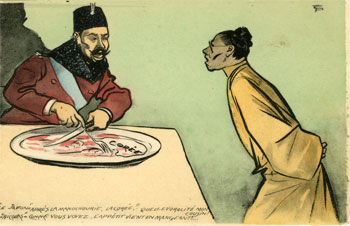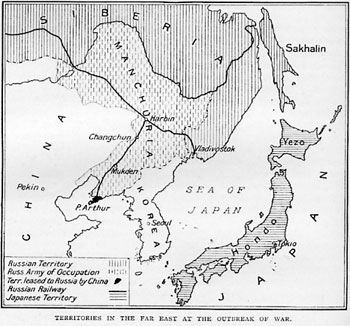 CAUSES of the WAR
CAUSES of the WAR

Causes, Part Three: The Japan-Britain Alliance of 1902

"After China, Korea." Japan has to watch as Russia begins cutting Korea in this French cartoon. C.B. Doleac collection. View larger image.
When Japan and Britain signed an alliance in 1902, Japan received the support it needed to challenge Russia on the mainland. The alliance recognized both nations' interests in China and pledged neutrality should either country, in supports of its interests in the Far East, become involved in a conflict with another power. However, either country would go to the aid of the other should a second nation become involved.
Attempts at Negotiation
With the British alliance behind it, Japan attempted without success to negotiate with the Russians over spheres of influence in Korea and China although there was support for settlement within the Russian government from such individuals, ironically, as Sergius Witte and Baron Rosen. While many Russians opposed expansion in Manchuria because its government was hard pressed to develop Siberia, the Tsar was determined to expand his empire as a divine responsibility. Further, the Tsar doubted the ability of the Japanese to defeat his large army and Asian navy.

Nicholas II, Tsar of Russia. Harper's Weekly.
There was similar conflict in the Japanese government between those who favored war and those who sought a peaceful settlement. For years, Japan tried to negotiate a settlement with Russia over Manchuria and Korea, but while attempting to reach a peaceful conclusion, the Japanese continued to prepare for war by building a large, well-trained army, and a powerful navy with modern ships.
Preparing for Battle
According to the terms of an earlier agreement with China, Russia was to withdraw its troops from Manchuria, but by April 1903, the date when the withdrawal was supposed to be in effect, the Russians were still in place and building up their army. By this point, the Japanese leadership and public opinion favored a military solution although talks with Russia continued throughout the rest of the year. When Japan was unable to receive concrete assurances from Russia regarding her intentions in Manchuria and Korea, Japan decided upon war.

Before the war began, Russia controlled Manchuria and retained a lease on Port Arthur. Sakhalin Island was also Russian territory. View larger image.
